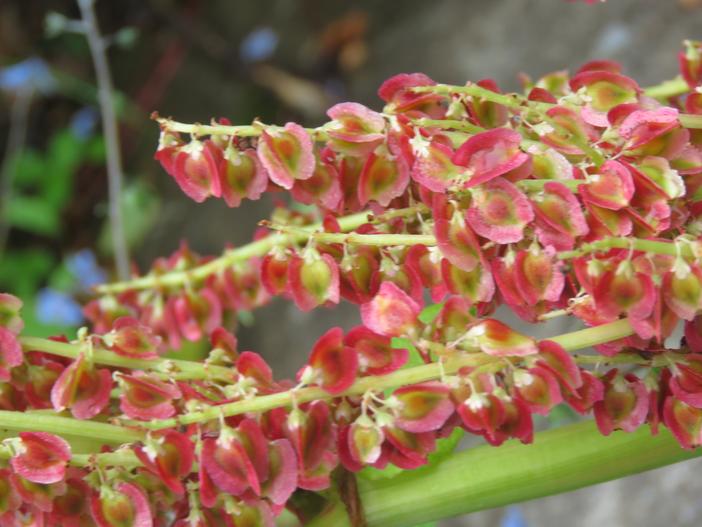Himalayan Rhubarb
(Rheum australe)
Himalayan Rhubarb (Rheum australe)
/
/

Vinayaraj
CC BY-SA 4.0
Image By:
Vinayaraj
Recorded By:
Copyright:
CC BY-SA 4.0
Copyright Notice:
Photo by: Vinayaraj | License Type: CC BY-SA 4.0 | License URL: https://creativecommons.org/licenses/by-sa/4.0 | Uploader: Vinayaraj | Publisher: Wikipedia Commons



























Estimated Native Range
Summary
Rheum australe, commonly known as Himalayan rhubarb, Indian rhubarb, or Red-veined pie plant, is a perennial herb native to the sub-alpine and alpine regions of the Himalayas, where it thrives at altitudes up to 13123 feet. It is typically found in open grasslands, rocky slopes, crevices, and along stream banks, contributing to the ecological diversity of high-altitude meadows. Rheum australe can reach a height of 3-6 feet with a similar spread and is characterized by its stout red stem, large heart-shaped leaves, and panicles of dark reddish-purple flowers that bloom in late spring to early summer. The flowers are showy and attract pollinators.
The plant’s bold foliage and striking flowers make it an attractive addition to ornamental gardens, especially in rockeries and borders that mimic its native mountainous terrain. In cultivation, Himalayan rhubarb requires well-drained soil, consistent moisture, and full sun to partial shade. It is valued for its medicinal properties, particularly in traditional medicine, and its stems are used as a culinary ingredient, similar to common garden rhubarb. However, only the stems should be consumed as the leaves contain high levels of oxalic acid, which is toxic. Gardeners should be aware that the plant can be quite large and may require space to accommodate its growth.CC BY-SA 4.0
The plant’s bold foliage and striking flowers make it an attractive addition to ornamental gardens, especially in rockeries and borders that mimic its native mountainous terrain. In cultivation, Himalayan rhubarb requires well-drained soil, consistent moisture, and full sun to partial shade. It is valued for its medicinal properties, particularly in traditional medicine, and its stems are used as a culinary ingredient, similar to common garden rhubarb. However, only the stems should be consumed as the leaves contain high levels of oxalic acid, which is toxic. Gardeners should be aware that the plant can be quite large and may require space to accommodate its growth.CC BY-SA 4.0
Plant Description
- Plant Type: Herb
- Height: 3-5 feet
- Width: 3-5 feet
- Growth Rate: Moderate
- Flower Color: Pink, Yellow
- Flowering Season: Spring, Summer
- Leaf Retention: Deciduous
Growth Requirements
- Sun: Full Sun, Part Shade
- Water: Medium
- Drainage: Medium
Common Uses
Border Plant, Edible*Disclaimer: Easyscape's listed plant edibility is for informational use. Always verify the safety and proper identification of any plant before consumption., Erosion Control, Low Maintenance
Natural Habitat
Native to sub-alpine and alpine regions of the Himalayas, found in open grasslands, rocky slopes, crevices, and along stream banks
Other Names
Common Names: Indian Rhubarb, Zang Bian Da Huang
Scientific Names: , Rheum australe, Rheum emodi, Rheum emodi, Rheum emodium, Rheum emodium,
GBIF Accepted Name: